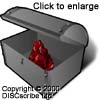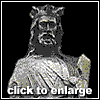|
| ||
 Along with contemporary William Wallace, Robert the Bruce is considered a founder of Scottish independence. Bruce gained control of Scotland from the English in 1306 and ruled it for twenty-three years.
Along with contemporary William Wallace, Robert the Bruce is considered a founder of Scottish independence. Bruce gained control of Scotland from the English in 1306 and ruled it for twenty-three years.Bruce had a hereditary claim to the Scottish throne; his grandfather had asserted his claim to the throne whenAlexander III died. Although he served the English king, Edward I, for four years, Bruce remained conscious of the movement for national independence, and of his own claim to lead the country. He was crowned in March of 1306, and wore down his enemies through brilliant guerilla and 'scorched earth' tactics.
Bruce's most famous battle took place at Bannockburn, where he decisively defeated the English and thwarted Edward II's attempt to take over Stirling Castle. The situation at Bannockburn looked so bad for the Scots that the English spent the night before the battle celebrating their anticipated victory. As it turned out, they should have anticipated the terrain instead. Although English troops outnumbered the Scots, Bruce's forces had the advantage in the boggy marshes of Bannockburn. They arranged themselves in four 'schiltrons' or circles, with access to safe retreat. Retreat was not necessary, however. Once hand-to-hand combat began, Scots had a clear advantage. English soldiers, weighed down with heavy armor, were trapped
by the bogs. As their ranks fell into disorder, a group of Scots observing the battle from a hilltop ran toward the battle, yelling Bruce's battle cry. Thinking that reinforcements had arrived, the English fled the battle.
The victory at Bannockburn solidified Bruce's claim to the throne. Further attempts by the English to make inroads into Scottish territory were defeated, and Robert the Bruce died as king of an independent Scotland.
themselves in four 'schiltrons' or circles, with access to safe retreat. Retreat was not necessary, however. Once hand-to-hand combat began, Scots had a clear advantage. English soldiers, weighed down with heavy armor, were trapped
by the bogs. As their ranks fell into disorder, a group of Scots observing the battle from a hilltop ran toward the battle, yelling Bruce's battle cry. Thinking that reinforcements had arrived, the English fled the battle.
The victory at Bannockburn solidified Bruce's claim to the throne. Further attempts by the English to make inroads into Scottish territory were defeated, and Robert the Bruce died as king of an independent Scotland.
| ||
|
| ||
Thursday, December 26th, 2019
Attention visitors: Tartans.com is back. Please note that this is a snapshot of the site as it existed nearly 20 years ago and you may encounter broken links; we are still combing through the site and correcting those as we find them. Please also note that some sections are currently not functional, primarily the discussion forums/clan chat boards.
|
** HOME - First Time Visitors - Glossary - - Contact Us ** Awards | Bibliography | Clan Calendar | Clan Chat | Clan Finder | History | Famous Scots | Genealogy | Great Hall of the Clans | Links | News and Features | Scots on the Net | Search | Site Map The Gathering of the Clans
Copyright 1995- Tartans.com - All Rights Reserved. |

